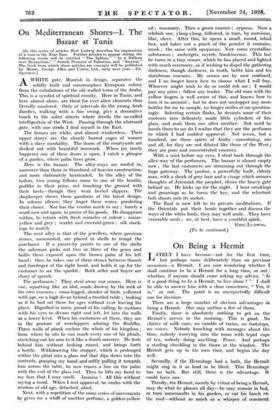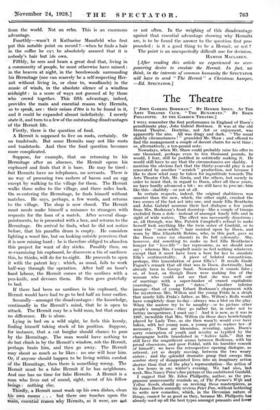On Being a Hermit
T .ATELY I have become—not for the first time, A but perhaps more deliberately than on previous occasions--a Hermit. I am now wondering whether I shall continue to be a Hermit for a long time, or not : whether, if anyone should come asking my advice, " Is it a good thing to be a Hermit, to live alone ? " I shall he able to answer him with a clear conscience, " Yes, it is," or not. The point is an unexpectedly difficult one for decision.
There are a large number of obvious advantages in being a Hermit. One may outline a few of them.
Firstly, there is absolutely nothing to get on the Hermit's nerves in the morning. This is good. No clatter of milk cans, no rumble of trains, no footsteps, no voices. Nobody knocking with messages about the time, nobody worrying into the room with tepid cups 'of tea, nobody doing anything. Peace. And perhaps za starling chuckling in the thorn at the window. The Hermit gets up in his own time, and begins the day well.
. Secondly, if the Hermitage had. a bath, the Hermit might sing in it as loud as he liked. This Hermitage has no bath. But still, there is the advantage. It could have one.
Thirdly, the Hermit, merely by virtue of being a Hermit, may do what he pleases all day—he may remain in bed, or turn somersaults in his garden, or eat his lunch on the roof—without so much as a 'whisper of comment from the world. Not an echo. This is an enormous advantage.
Fourthly—wasn't it Katharine Mansfield who first put this notable point on record ?—when he finds a hair in the coffee he c.v.: be absolutely assured that it is nobody's hair but insown.
Fifthly, he sees and hears a great deal that, living in a community of people, he must otherwise have missed : in the heaven at night, in the ,beechwoods surrounding his Hermitage (one can scarcely be a self-res-pecting Her- mit without living in, or close to, woodlands) in the music of winds, in' the absolute silence of a -windless midnight : in a score of ways not guessed at by those whO crowd together. This fifth advantage, .. indeed, provides the main and essential reason why. Hermits, -so to speak, -are : their raison d'gtre is to be found in it, and it could be expanded almost indefinitely. I merely state it, and turn to a few of the outstanding disadvantages Of the Herinit life. Firstly, there is the question of food.
A Hermit is supposed to live on roots, certainly. Or on toadstools. But some Hermits may not like roots and toadstools. And then' the food question becomes more complicated.
• Suppose, for example, that on returning to his Hermitage after an absence,' the Hermit opens his cupboard and finds that it is bare. He may be tired : but Hermits have no telephones, no servants. There' is no way of procuring two rashers of bacon and an 'egg except by walking to the village for them. The Hermit walks three miles to the village, and three miles back. On re-entering the Hermitage, he 'finds himself without matches. He says, perhaps, a few words, and returns to the' village. The shop is now closed. The Hermit must needs make himself a nuisance to strangers with requests for the loan of a match. After several disap- pointments, he is presented with a box, and returns to the Hermitage. On arrival he finds, what he did not notice before, that his paraffin drum is empty. He considers lighting a wood fire, but on looking outside perceives that it is now raining hard : he is therefore obliged to abandon this project for want of dry sticks. Possibly then, on re-examining his cupboard, he discovers a tin of sardines: this, he thinks, will do for to-night. He proceeds to open it with the patent key : which, as usual, fails to work half-way through the operation. After half an hour's -lard labour, the Hermit comes at the sardines with a pen-knife, and devours them. He then goes gratefully to bed.
If there had been no sardines in his cupboard, the Hermit would have had to go to bed half an hour earlier.
Secondly—amongst the disadvantages : the knowledge, continually in the Hermit's mind, that he is open to attack. The Hermit may be a bold man, but that makes no difference. He is alone.
Lying in bed on a wild night, he feels this keenly, finding- himself taking stock of his position. Suppose, for instance, that a cat burglar should chance, to pass by the Hermitage. The man would have nothing to do but climb m by the Hermit's window, rob the Hermit, perhaps brain him, and then go away. The HerMit may shout as much as he likes : no one will hear him. Or, if anyone should happen to be living within earshot of the Hermitage, then there is something wrong. The Hermit must be a false Hermit if he has neighbours. And One has no time for false Hermits. A Hermit is a man who lives out of sound, sight,, scent of his fellow beings : nothing else.' Thirdly, a Hermit must wash up his own dishes, clean his own rooms . . . but there one touches upon the main, essential reason why Herinits, as it were, are not or not often. In the weighing of this disadvantage against that essential advantage showing why Hermits are, is to be found the answer to the question first pro- pounded : is it a good thing to be a Hermit, or not ?
The point is an unexpectedly difficult one for decision.
HAMISR MACLAREN.
[After reading this article we experienced no over- powering desire to emulate the Hermit. In fact, we think, in the interests of common humanity the SPECTATOR will have to send " Thi Hermit a Christmas hamper., —Ed. SPECTATOR.]



















































 Previous page
Previous page